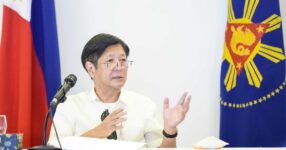
Marcos signs into law ‘Loss and Damage Fund Board Act’
PRESIDENT Ferdinand “Bongbong” Marcos Jr. signed into law on Wednesday, August 28, 2024, the “Loss and Damage Fund Board Act.”
Marcos signed into law Republic Act No. 12019, known as the “Loss and Damage Fund Board Act,” which grants the country’s juridical personality and legal capacity to the Loss and Damage Fund Board, which responds to loss and damage due to climate change.
The measure will also enable the Board, as the governing body of the Fund, to have a juridical personality with full legal capacity to contract, acquire, and dispose of immovable and movable property, as well as institute legal proceedings.
It will also have the legal capacity to negotiate, conclude, and enter into a hosting arrangement with the World Bank as interim trustee and host of the Fund’s secretariat, and to undertake activities as necessary for discharging its roles and functions.
Marcos earlier said the Philippines’ position on the Board of the Loss and Damage Fund will complement all of the country’s climate adaptation and mitigation measures, as it will “give us a strong voice to access the needed financial assistance for climate-related initiatives and impacts.”
The Philippines has secured a seat in the inaugural Loss and Damage Fund Board at the 28th United Nations Climate Change Conference (COP28) in Dubai in December 2023.
The country will serve as a full member of the board in 2024 and 2026 while an alternate member in 2025, representing the Asia Pacific Group along with United Arab Emirates, Saudi Arabia and Pakistan in a term-sharing agreement.
The loss and damage fund intends to provide financial assistance to support countries, such as the Philippines and other island states, struggling to cope with loss and damage caused by climate change beyond adaptation.
Developed countries have pledged over $700 million in initial capital to address the negative consequences of climate change, including rising sea levels, prolonged heat waves, desertification, ocean acidification, and extreme events such as bushfires, species extinction, and crop failures.
Marcos earlier said that the Philippines is one of the countries that are least responsible but suffer the most due to climate change. (TPM/SunStar Philippines)



